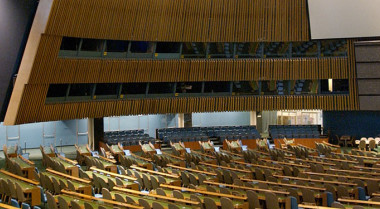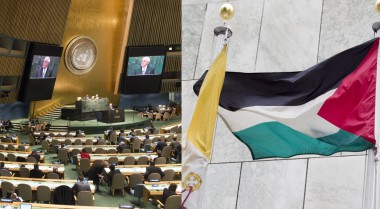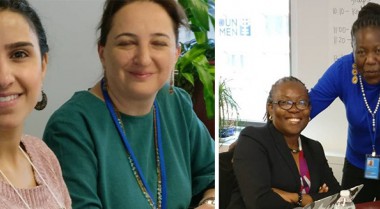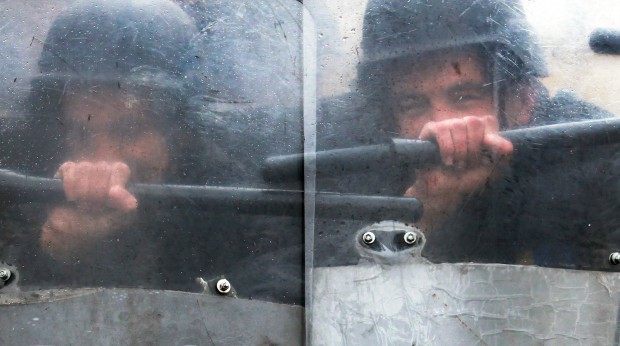
Is "Passionate Appeal" Enough for Prevention? The Power Imbalance Challenges the UN to Act
In a world where having your voice heard depends on access to the right places and people, the United Nations’ (UN) job to uphold a strategic commitment to a ‘culture of prevention’ to maintain international peace and security for everyone is paramount.
But who is everyone? Member States? “The People”?
Preventive diplomacy and strengthened partnerships are some of the key pillars of crises prevention, according to António Guterres, the UN Secretary-General. Prevention gains recognition and demonstrates impact through community engagement, regional partnerships, transformation of thinking.
Yet, when hegemons like the United States get involved and the principles of prevention are put to test, the outcome highlights where the power resides. It also presents the imperative for the UN and its membership to rethink the power structures in the multilateral space.
Take the recent tension between the US and Iran.
While people of the world were following how the tensions between the Islamic Republic of Iran and the United States play out following the killing of Qassem Soleimani, the Secretary-general issued a “Passionate Appeal for Peace”. The UN Security Council, the main international body responsible for international peace and security, responded. Well, not really...
First of all, the UN Security Council has its limitations as a forum for “preventive diplomacy.” The US has unilaterally prevented the highest levels of Iran’s government to join the debate at the Security Council. Iran’s Foreign Minister Javad Zarif was not issued a visa to come to the Security Council debate - a clear violation of the 1947 U.N. Headquarters Agreement Act.
We, at the New York international hub, are used to the inability of local peacebuilders to bring their experiences and perspectives to important policy discussions and contribute to norm-building at the UN Headquarters. The denial of visas indicates that some UN Member States are more equal than others. And, the US gets to decide.
There have been few attempts to provide a platform for “the people” to engage in dialogue and advise on preventing further escalation.
If the US can as easily get themselves out of a “tricky” discussion, what future does preventive diplomacy have?
Next, we would assume that the United Nations’ commitment to understanding the situation on the ground by working with local communities and fostering their active engagement in decision-making would apply in the situation with Iran as it does elsewhere. Yet, there have been few attempts to provide a platform for “the people” to engage in dialogue and advise on preventing further escalation. The tensions are affecting not only the highest and mightiest in the Iranian and US governments. It affects people even more. It affects people in Iran. It affects people in Iraq. It affects people all over the region.
The only serious actions to engage in diplomacy and dialogue have been through the Swiss Foreign Ministry. The Swiss chargé d’affaires in Iran has exchanged letters between Iran, the United States, and the UN Secretary-General, who has been the only UN voice on the situation.
How many of these letters include the opinions of people most affected?
While good faith effort has been made to stop the escalation of violence before proceeding with any additional measures, these communications have a tremendous impact on the lives of people and may make assumptions that fuel division. President Trump claimed his ability to reflect the needs and interests of Iranian people while tweeting in Farsi. Western media speculation on these needs and interests have also fed into dangerous narratives.
UN relocation can provide a useful space for the transformation of power relations in the current multilateral system.
Even a brief analysis of the UN response to the recent tension between the US and Iran reveals that the current multilateral strategy on prevention needs improvement.
So, where do we go from here?
First, the multilateral system cannot deliver on prevention when one member state can decide for others. No one enjoys being left out, even member states. But, at the member state level, this has serious foreign policy implications.
One way to tackle the situation would be to move the UN outside the US, preferably to a country in the Global South, where local peacebuilders would have more access and the capacity to engage. The US’s recent withdrawal from multilateral treaties and cuts to humanitarian aid have opened space for other Member States to fill in. UN relocation can provide a useful space for the transformation of power relations in the current multilateral system.
The UN and its Security Council must remember that they not only work for member states, but also for “the people.”
Second, traditional UN tools and mechanisms still maintain their exclusiveness, where the relevance of one’s perspectives is still determined by how close they are to power.
The UN and its Security Council must remember that they not only work for member states, but also for “the people.” Thus, the Secretary-General’s approaches to swiftly respond to escalating conflicts need to be supported by appropriate platforms for dialogue and multi-stakeholder engagement, especially at the regional level. At the same time, the UN Security Council should not forget that prevention is also the mandate of the Council. While the Council is “stretched” to address the issues on its agenda, it should reconsider its capacity and structures from the lens of prevention.
The UN and member states should also move away from their exclusive attention to “focus countries.” This approach undermines opportunities for peace. Conflicts no longer take place within the borders of one state. The situation in Iran demonstrates this. It requires working at the regional level and strengthening regional peacebuilding capacities.
Power aspect is something that peace and security experts do not take seriously. Largely, they see it as a feminist concern. Yet, it impacts decisions and restricts choices for many. It affects people and challenges the credibility of institutions. As such, the lessons need to be turned into action. And fast - because silence today does not mean silence tomorrow.



